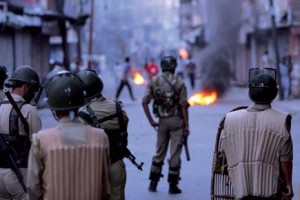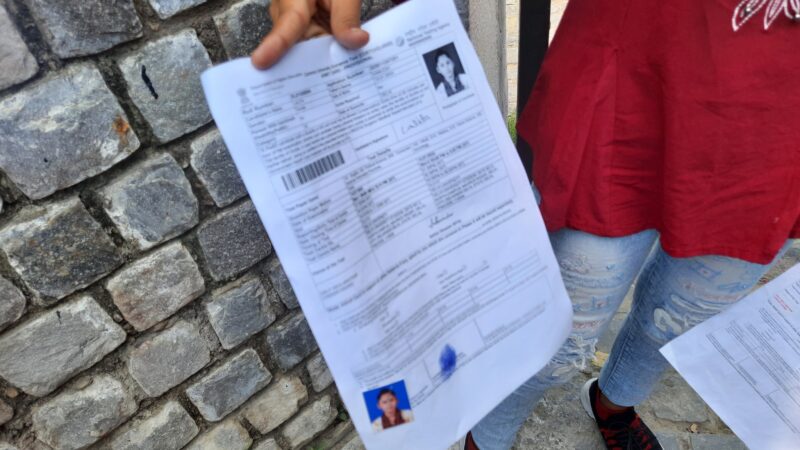Resist This Draconian Bill ! Down With J&K’s Own Homegrown AFSPA! !

More powers in special zones: J&K police Bill has AFSPA ring
Muzamil Jaleel, Indian Express, Posted online: Sun Feb 24 2013, 02:24 hrs
Srinagar : While Jammu and Kashmir Chief Minister Omar Abdullah frequently speaks out against the Armed Forces Special Powers Act in force in the state, as per a Bill drafted by his own government, the state police could get powers quite similar to the controversial legislation.
The 76-page ‘Jammu and Kashmir Police Bill, 2013’, made public recently, allows the state to declare any area disturbed, proposing setting up “Special Security Zones” where “administrative and development measures” are integrated with police response for “problems of public order and security”.
Negating the role of civil administration like a district magistrate in affairs of law and order, the Bill proposes that police be able to set up and arm controversial militia of civilians — as “village defence committees” — and recruit special police officers outside the existing police structure. It also plans a stringent confidentiality clause that could override the existing Right to Information Act in the state.
The Bill was posted on the home department’s website on February 15, while Kashmir was under curfew following Afzal Guru’s hanging, with a notification inviting suggestions for the next two weeks.
Under the draft legislation, a police officer would be considered “always on duty” and the government as well as the complaints authority deputed to hear cases against him/her would have legal immunity regarding decisions taken by them “in good faith or intended to be done in pursuance of the provisions” of the Bill. In fact, the good faith clause — also the main basis of immunity under the AFSPA — in the draft legislation is vague, doesn’t spell out whether the police force itself falls under “government” and is thus open to wider interpretation.
There is also a six-month deadline on entertaining a complaint made against a police official from the “occurrence of the incident”.
While the civil administration sees the Bill as a bid to encroach on its powers, activists see it as an attempt to exert control. “The draft police Bill essentially reads as a blueprint on how to exercise control on the populace,” said noted human rights lawyer Parvez Imroz. “Within these (Special Security) zones, the attempt is to allow the police and its functionaries, the SPOs, absolute and unaccountable power. It allows for a different Standard Operating Procedure within these zones, without specifying the limits to these powers.”
Imroz also questioned the expansion of the role of SPOs and village defence committees. “The government is seeking to formalise practices that have resulted in structural police violence in Jammu and Kashmir,” he said.
Senior J&K High Court lawyer Riyaz Khawar accused the government of trying to make a police state. “They are taking away magisterial powers and giving it to the police,” Khawar said. “So even if the AFSPA is repealed, they would have already brought it back via this police Act.”
Minister of State for Home Sajad Kichloo claimed that “most of the features in the draft Bill are based on a model Bill prepared by a committee of eminent experts constituted by the government of India and on the directions of the Supreme Court”. They would consider the suggestions received on it, he added.
Some of the proposals:
- Any person cleaning a furniture or vehicle, slaughtering an animal, cleaning a carcass or grooming an animal in a public place would invite punishment. So would those trespassing into a government building or land, and those driving, dragging or pushing any non-motorised vehicle at any time between half an hour after sunset and one hour before sunrise. Knowingly defecating or urinating in a public place with a view to cause “annoyance”, breaking any queue in any public place and other similar “violations of public order” are also frowned upon. Such “offences” would invite imprisonment up to six months or fine up to Rs 2,000.
- The director general of police would draw up an “Internal Security Scheme” for the entire state and formulate an SOP. Under it, even lawful activity by a group or organisation that has the “potential of disturbing law and order” would need prior police permission.
- The state government may declare any area a Special Security Zone (SSZ), when such area is “widely and intolerably beset with violence or insurgency or destruction of public property on account of communal or terrorist or anti-national activities”. These SSZs would have a “suitable administrative structure, which shall integrate administrative and developmental measures in the area with the police response to deal with problems of public order and security”.
- Any inflow of funds as well as “production, sale, storage, possession or entry of any devices or equipment” into SSZs be banned if these are “reasonably considered a threat to internal security or public order in any manner”.
- There must be a ‘State Security Commission (SSC)’ with the CM as its chairman, the home minister or minister of state for home as its vice-chairman, a retired high court judge as its member, and the DGP, the chief secretary and the home secretary as ex-officio members (Activists have pointed out that there are no members from the Opposition in the proposed commission).
- A Police Complaints Authority, at the state and district levels, be set up to look into grievances against police officials.
